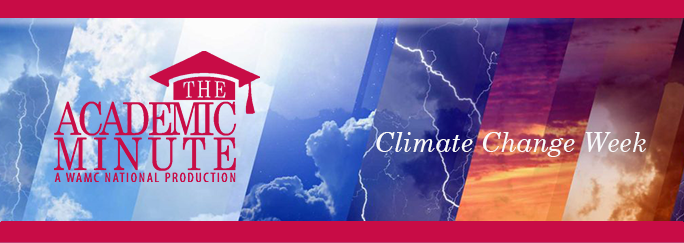
Academic Minute from 10.2 – 10.6
Monday, October 2nd
Firmin DeBrabander – Maryland Institute College of Art
Why Climate Change is a Hard Sell in the U.S.
Firmin DeBrabander studied Philosophy at Boston College and the Catholic University of Louvain in Belgium, and received his Ph.D. in the field from Emory University in 2002. He has taught at MICA since 2005, and served as chair of the Humanistic Studies department from 2009 until 2012. His specialties include the History of Western Philosophy, Ethics, Political Theory, and Environmental Ethics. He also teaches courses on Media Ethics, Economic Theory, Eastern Philosophy, Philosophy of Science, and Medical Ethics. In 2007, he published a book entitled Spinoza and the Stoics (Continuum). He has published academic articles in journals such as History of Philosophy Quarterly, International Philosophy Quarterly, and in a volume issued by Cambridge University Press entitled Stoicism: Traditions and Transformations. More recently, he has written social and political editorials for the Baltimore Sun, Counterpunch and Common Dreams. He has organized several symposia in honor of Constitution Day at the college, including such speakers as John Waters, Helen Thomas, Angela Davis, Ralph Nader, Jesse Jackson, Amy Goodman, Andrew Sullivan, and Cornel West.
Tuesday, October 3rd
Brian King – Penn State University
Climate Change and the Fight Against HIV
Brian King is Associate Professor of Geography and Faculty Associate at the Population Research Institute at the Pennsylvania State University. He is also a 2017 National Academy of Science Kavli Fellow and Research Associate at the African Climate and Development Initiative at the University of Cape Town. His research concentrates upon several topics, particularly the impacts of conservation and development in Southern Africa, social and environmental justice, and the intersections between livelihoods, health and environment. Brian is the PI on a NSF CAREER project that is examining how social and ecological systems in South Africa adjust in response to HIV/AIDS.
Wednesday, October 4th
Jonathan Kingslake – Columbia University
Discovering Rivers and Lakes in Frozen Antarctica
I grew up in Reading UK, 20 minutes by train from London. I went to Chiltern Edge Secondary School (11-16yrs) and Henley Sixth Form College (17-18yrs).
After two years of working and backpacking I went to The University of York, UK, to study undergraduate physics. My final year project was on the nucleation of freezing in supercooled water, supervised by Dr Richard Keesing. We scattered a laser through droplets of supercooled water to observed freezing as it was initiated by the application of an electric field.
In 2009 I was awarded a University Scholarship and started a PhD in glaciology in the Department of Geography at Sheffield University, supervised by Dr Felix Ng. I wrote a thesis entitled ‘Modeling ice-dammed lake drainage’ (pdf). I used mathematical models to study how water flows beneath glacier (see research section).
In 2013 I started as a Glacier Geophysicist at the British Antarctic Survey (BAS), Cambridge, UK. I was employed on a NERC-funded project led by Richard Hindmarsh. We used radar and mathematical models to study present-day and past ice flow in West Antarctica.
In March 2016 my wife and I moved from the UK to start my current position as Assistant Professor in the Department of Earth and Environmental Sciences, Columbia University, and the Lamont-Doherty Earth Observatory. I am continuing my research in Glaciology and teaching undergraduate and graduate students. I collaborate with members of the Polar Geophysics Group here at Lamont, and colleagues from Sheffield (e.g. J. Ely, S. Livingstone), BAS (e.g. A. Brisbourne, C. Martín) and elsewhere.
Thursday, October 5th
John Huntley – University of Missouri
Climate Change and Parasites
Dr. Huntley is broadly interested in the fossil record of biotic interactions (including parasitism, predation, and competition), stratigraphic paleobiology, conservation paleobiology, and the evolution of morphological disparity. He completed a BS in Geology at Appalachian State University, a MS in Geology at the University of North Carolina at Wilmington (Advisor: Patricia Kelley), and a PhD in Geosciences at Virginia Polytechnic Institute and State University (Advisor: Michał Kowalewski). Following a one-year postdoctoral assignment at Virginia Tech he spent one year as Lecturer at the University of Kentucky, two years as a Humboldt Research Fellow at the GeoZentrum Nordbayern in Erlangen (Germany), and two years as Visiting Assistant Professor at St. Lawrence University. Dr. Huntley joined the Department of Geological Sciences at the University of Missouri in 2013 as an Assistant Professor. The subjects of Dr. Huntley’s research span invertebrates and protists from the marine, freshwater, and terrestrial realms ranging in age from Paleoproterozoic to Anthropocene. His current favorites are modern bivalves (especially when pasta, olive oil, and wine are involved).
Friday, October 6th
Ethan Coffel – Columbia University
Aviation and Climate Change
I’m a fifth-year PhD student at Columbia studying atmospheric science and climate change impacts in the Earth & Environmental Sciences department and working with Dr. Radley Horton at NASA GISS.
My research is focused on the causes and impacts of extreme temperature and precipitation events, and how the frequency and magnitude of these events may change over the next century. I’m an NSF graduate research fellow and a member of the Northeast Climate Science Center, a group dedicated to studying climate change impacts in the northeast United States. I graduated from Northwestern University in 2013 with majors in computer science and integrated science.
